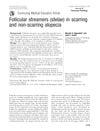How Do You Treat Premature Hair Loss in Women in Your Practice
April 2016
in “
Medical Acupuncture
”

TLDR The document concludes that hair loss in women is treated with medications, therapies, and surgery in Western medicine, and with acupuncture and herbs in Chinese medicine, but hereditary hair loss is hard to reverse.
The document discusses various types of hair loss in women, including androgenetic alopecia, alopecia areata, scarring alopecia, anagen effluvium, telogen effluvium, and trichotillomania, as well as their treatments. Western biomedicine typically treats hair loss with minoxidil, finasteride, low-level laser therapy, wigs, and hair transplants, with alopecia areata being treated with local steroid injections. The document also explores the perspective of Chinese Medicine on hair loss, suggesting that gradual hair loss is due to Deficiency while clumpy hair loss is due to Excess conditions. It mentions that acupuncture, especially when combined with Chinese herbs or homeopathic remedies, can lead to general symptom improvement and healthier hair, with a >90% cure rate for alopecia areata over 4-6 months reported by the author. However, the document notes that there is little evidence that acupuncture can reverse hereditary hair loss, and all treatments should be supervised by a qualified Traditional Chinese Medicine practitioner.






